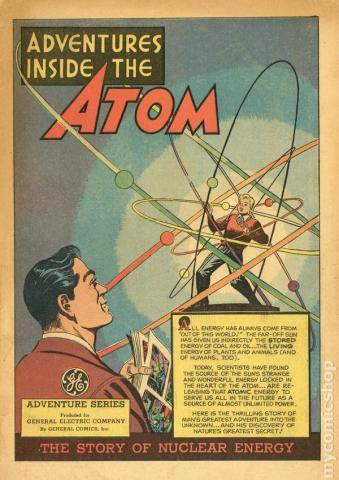This image depicts the front cover of "Adventures Inside the Atom," a comic-book history which General Electric produced in 1948. Online via the U.S. National Archives.
A "comic book" history about atomic power, called "Adventures Inside the Atom," is available for review at the U.S. National Archives. General Electric created the book in 1948, at the request of the Assistant Manager for Public Education, Oak Ridge Operations Office, Atomic Energy Commission.
It predicts that atomic energy, in the future, will:
- run nuclear-powered ships
- produce radioactive tracers “to help cure disease”
- “probably generate tremendous electric power.”
Those events have all come to pass.
Albert Einstein’s 1939 letter, in the comic-book history, is key to the story:
Mr. President, Professor Einstein asked
that his letter be delivered to you personally.
What the President did, in direct response to the letter, changed the world:
And the President of the United States brought together history’s largest combination of ...
-
The fabulous resources of the world’s richest nation
-
The knowledge of the world’s most brilliant scientists
-
The ‘know-how’ of America’s great business leaders
-
An army of skilled industrial workers
-
The security of military power
-
To build a tremendous new industrial city to separate U235 from its chemical twin, U238.
The story concludes with this observation about nuclear power:
Someday there will be enough power for everybody everywhere
and this prediction:
You’re lucky, Johnny...Facing a wonderful future.
To close the loop of optimism, however, perhaps this additional point should be made:
... As long as all governments with nuclear power act responsibly.
NOTE ABOUT EINSTEIN IN HIS LATER YEARS:
Near the end of his life, Einstein continued to work on a theory which he aimed to be his most important. It would, he hoped, explain everything about the universe.
Working on it for thirty years, Einstein passionately believed in his work, but others thought he had lost his brilliant reasoning ability. His project, after all, was an attempt to square his belief that God had created the universe (and everything about it was predictable if one only asked the right questions) ... compared to ... the world-changing scientific findings (like his theory of general relativity) which he had personally made.
People working in quantum mechanics (a discipline which directly developed from Einstein's theories) began to find that they could not accurately predict how small particles behave under certain conditions. Their use of "probabilities" - which greatly annoyed Einstein - conflicted with his belief that all of science can be predicted with certainty.
Even on his deathbed, Einstein worked on his theory to explain everything. He did not accomplish that objective, although physicists are still trying to determine whether such a possibility exists.


 Back
Back
 Next Chapter
Next Chapter

 Back
Back



